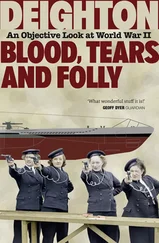‘ Come along and see them ,’ urged the IBM man. Being somewhat obsessed by machinery (while not really understanding it) I went along. Soon I became the only private individual permitted ownership of an IBM MT 72 computer. It was the size and shape of a small upright piano. I was very proud of that machine, I showed it to everyone who visited me, but it was Ellenor who mastered it.
My friend Julian Symons, the writer and doyen of critics, said I was the only person he knew who actually liked machines. ‘ Perhaps you should write a book about them ’, he said, only half seriously. That was the start of Bomber . Does everyone hate machines? Perhaps they do; so suppose I wrote a story in which the machines of one nation battled against the machines of another? Yes, I knew about that. I had been bombed every night for months at a time in London. The night bombing campaigns were fought in complete darkness, with both the enemy aircraft and the terrain below depicted only as tiny blips and blobs on glass screens. The combatants never saw their enemies. It had a spooky fascination for me but would such a grim mechanical theme overshadow a story’s human element?
The human element was already a difficult aspect of writing such a story. Most of the characters – both British and German – would be able-bodied young men chosen for their physical, emotional and psychological similarity. To make it more difficult, my preliminary notes showed that I would need a cast of well over a hundred of these similar young people. This meant a style that would bring a character to life in only a sentence or two of dialogue. And do it well enough for the reader to pick up on that character two or three chapters later. And I was determined to do it without resorting to crude regional pronunciations.
It was daunting. I began to talk to experts and discovered how deep I was going to have to dig for my research. German radar was very advanced by 1943; it was only after that that Anglo American technology took the lead. But the Germans lost their technical lead and lost the war too. That meant that very few people had taken any interest in the history of German air defences. I went to Germany and sought out the technicians and radar operators as well as the night-fighter pilots and Flak crews. Then I had to put their explanations together well enough to understand the basis of the German air defence system. The more I learned about it, the more it fascinated me.
If 1943 German radar controllers and night-fighter veterans were a complex challenge, then wait until I started to delve into the social life, scandals and Nazi-led politics of a small Westphalian town. Everyone seemed to have a war story. One lady found for me some striped overalls that she had made from her nurse’s uniform. A man I met in a restaurant had kept all his wartime documents and when I showed interest in them insisted that I kept them. My wife Ysabele’s fluent German was the key to this conversational research and greatly expanded the number of people and stories available to me.
It was almost overwhelming but it was too late to stop, and anyway I enjoy research. One large room of my London home was devoted entirely to Bomber . I collected everything available: films, air photos, logbooks, letters, recordings, tele-printer orders and target maps. Pasting aeronautical maps together I covered one whole wall with northern Europe. Tapes of the bomber routes, turning-points, dog-legs and feints showed each aircraft in the story. Tabs for times meant I could see where each fighter or bomber would be at any chosen moment.
The anchor of the story was to be found in England’s Bomber Command airfields. I knew many of them from my time in the RAF and I returned to see them again. My RAF veterans were great companions with anecdotes galore, and during my service years I had flown in Mosquitos and in Lancaster bombers. In Germany Adolf Galland found for me some of the best of his night fighter crews. The Dutch air force allowed me to spend some time on a military airfield that was very little changed from 1943. By amazing luck I was able to find, enter and climb around one of the very few Luftwaffe ‘Opera House’ command centres just days before its demolition began. It was a vast echoing place and by chance the demolition crews had left all the electric lights burning, probably for safety reasons. Back in London my good friends at the Imperial War Museum gave me a room filled with Luftwaffe instructional films about the night-fighter version of the Junkers Ju 88 and by bending the rules a little I also got to climb inside one.
Right from the first notes I had decided upon the twenty-four hour time format. It meant that I would describe only one RAF bombing raid but I could depict it in detail. By describing mechanical elements (such as the number of fragments into which the average anti-aircraft shell breaks) I wanted to emphasize the dehumanizing effect of mechanical warfare. I like machines but in wars all humans are their victims.
Len Deighton, 2009
Although I have attempted to make its background as real as possible this is entirely a work of fiction. As far as I know there were no Lancaster bombers named ‘Creaking Door’, ‘The Volkswagen’ or ‘Joe for King’. There was no RAF airfield named Warley Fen and no Luftwaffe base called Kroonsdijk. There was no Altgarten and there were no real people like those I have described. There was never a thirty-first day of June in 1943 or any other year.
L.D.
It was a bomber’s sky: dry air, wind enough to clear the smoke, cloud broken enough to recognize a few stars. The bedroom was so dark that it took Ruth Lambert a moment or so to see her husband standing at the window. ‘Are you all right, Sam?’
‘Praying to Mother Moon.’
She laughed sleepily. ‘What are you talking about?’
‘Do you think I don’t need all the witchcraft I can get?’
‘Oh, Sam. How can you say that when you …’ She stopped.
He supplied the words: ‘Have come back safe from forty-five raids?’
She nodded. He was right. She’d been afraid to say it because she did believe in witchcraft or something very like it. In an isolated house in the small hours of morning with the wind chasing the clouds across the bright moon it was difficult not to fall prey to primitive fears.
She switched on the bedside light and he shielded his eyes with his hand. Sam Lambert was a tall man of twenty-six. The necessity of wearing his tight-collared uniform had resulted in his suntan ending in a sharp line around his neck. His muscular body was pale by comparison. He ran his fingers across his untidy black hair and scratched the corner of his nose where a small scar disappeared into the wrinkles of his smile. Ruth liked him to smile but lately he seldom did.
He buttoned the yellow silk pyjamas that had cost Ruth a small fortune in Bond Street. She’d given them to him on the first night of their honeymoon; three months ago, he’d smiled then. This was the first time he’d worn them.
As the only married couple among Cohen’s guests, Ruth and Sam Lambert had been given the King Charles bedroom with tapestry and panelling so magnificent that Sam found himself speaking in whispers. ‘What a boring weekend for you, darling: bombs, bombing, and bombers.’
‘I like to listen. I’m in the RAF too, remember. Anyway we had to come. He’s one of your crew, sort of family.’
‘Yes, you’ve got half a dozen brand-new relatives.’
‘I like your crew.’ She said it tentatively, for just a few trips ago her husband had flown back with his navigator dead. They had never mentioned his name since. ‘Has the rain stopped?’ she asked.
Lambert nodded. Somewhere overhead an aeroplane crawled across the cloud trying to glimpse the ground through a gap. On a cross-country exercise, thought Lambert, they’d probably predicted a little light cirrus. It was their favourite prediction.
Читать дальше












